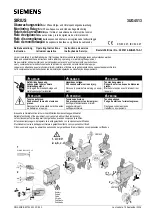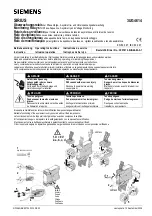
Date Code 20011205
Testing and Troubleshooting
13-5
SEL-311A Instruction Manual
Test Methods
Test the pickup and dropout of relay elements using one of three methods: target command
indication, output contact closure, or sequential events recorder (SER).
The examples below show the settings necessary to route the phase time-overcurrent element
51PT to the output contacts and the SER. The 51PT element, like many in the SEL-311A Relay,
is controlled by enable settings and/or torque control SEL
OGIC
®
control equations. To enable the
51PT element, set the E51P enable setting and 51PTC torque control settings to the following:
·
E51P = Y
(via the
SET
command)
·
51PTC = 1
(set directly to logical 1, via the
SET L
command)
Testing Via Front-Panel Indicators
Display the state of relay elements, inputs, and outputs using the front-panel or serial port
TAR
commands. Use this method to verify the pickup settings of protection elements.
Access the front-panel
TAR
command from the front-panel OTHER pushbutton menu. To
display the state of the 51PT element on the front-panel display, press the OTHER pushbutton,
cursor to the TAR option, and press SELECT. Press the up arrow pushbutton until TAR 28 is
displayed on the top row of the LCD. The bottom row of the LCD displays all elements asserted
in Relay Word Row 28. The relay maps the state of the elements in Relay Word Row 28 on the
bottom row of LEDs. The 51PT element state is reflected on the LED labeled B. See Table 9.3
and Table 9.4 for the correspondence between the Relay Word elements and the
TAR
command.
To view the 51PT element status from the serial port, issue the
TAR 51PT
command. The relay
will display the state of all elements in the Relay Word row containing the 51PT element.
Review
TAR
command descriptions in
Section 10: Serial Port Communications and
Commands
and
Section 11: Front-Panel Interface
for further details on displaying element
status via the
TAR
commands.
Testing Via Output Contacts
You can set the relay to operate an output contact for testing a single element. Use the
SET L
command (SEL
OGIC
control equations) to set an output contact (e.g., OUT101 through OUT108)
to the element under test. The available elements are the Relay Word bits referenced in
Table 9.3 and Table 9.4.
Use this method especially for time testing time-overcurrent elements. For example, to test the
phase time-overcurrent element 51PT via output contact OUT104, make the following SEL
OGIC
setting:
OUT104
=
51PT
Time-overcurrent curve and time-dial information can be found in
Section 9: Setting the Relay
.
Do not forget to reenter the correct relay settings when you are finished testing and are ready to
place the relay in service.
Summary of Contents for SEL-311A
Page 6: ......
Page 8: ......
Page 10: ......
Page 24: ......
Page 40: ......
Page 66: ......
Page 96: ......
Page 98: ......
Page 112: ......
Page 114: ......
Page 122: ......
Page 170: ......
Page 202: ......
Page 204: ......
Page 246: ......
Page 248: ......
Page 286: ......
Page 290: ......
Page 304: ......
Page 306: ......
Page 334: ......
Page 384: ......
Page 386: ......
Page 394: ......
Page 398: ......
Page 402: ......
Page 404: ......
Page 410: ......
Page 412: ......
Page 426: ......
Page 444: ......
Page 460: ......
Page 474: ......
















































